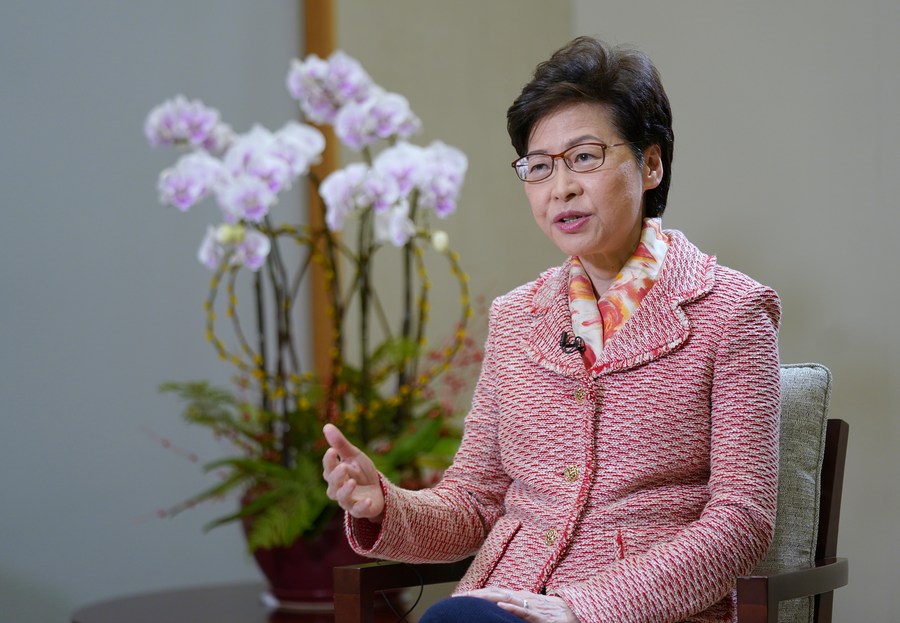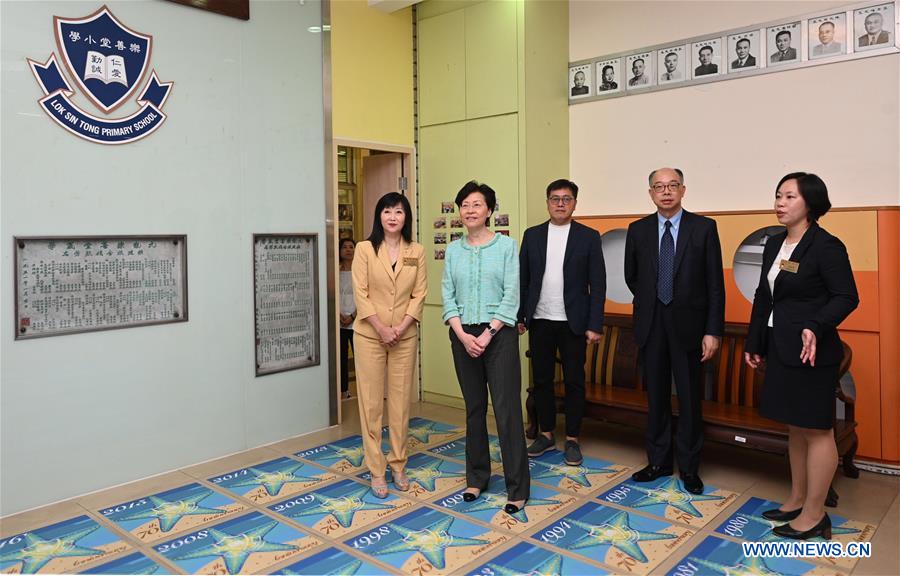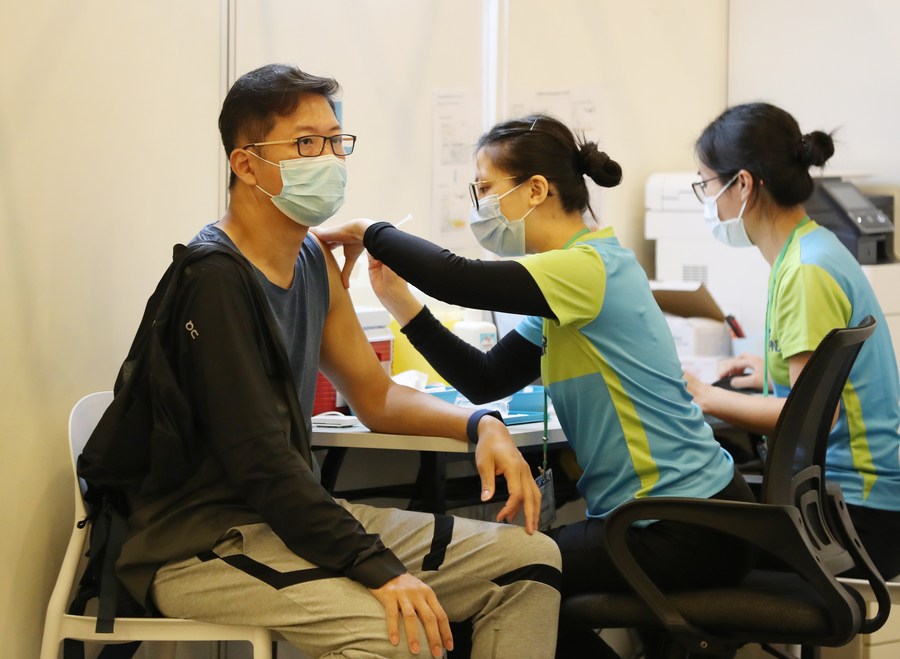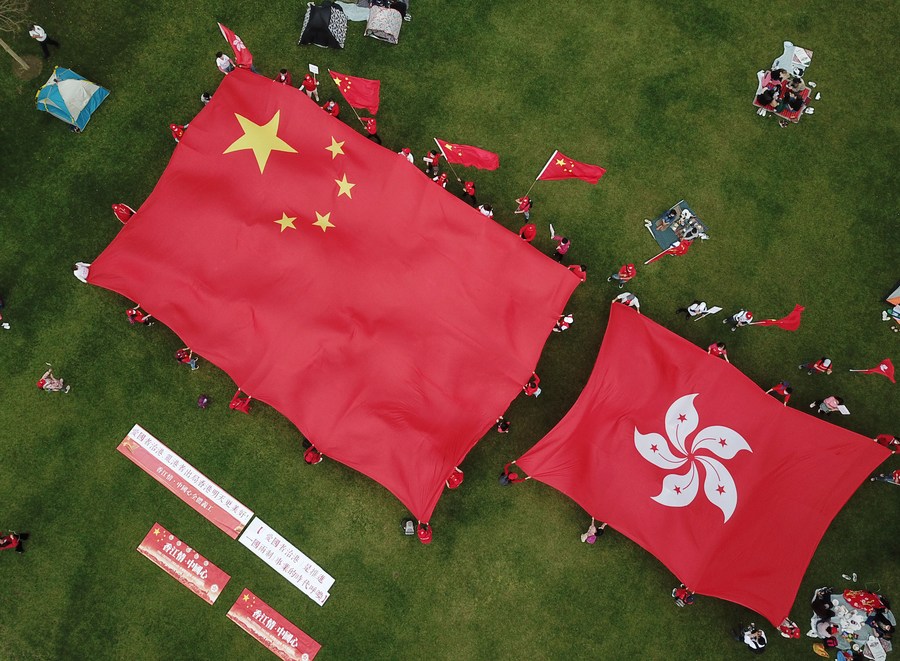Looking ahead, Lam promised intensified efforts to improve education, media, and the training and management of civil servants. “With these work being done, people will have more confidence in ‘one country, two systems,’ no matter they are local residents, people from the mainland or foreigners.”
— “We will certainly do more to reach out to the people, understand their concerns and respond directly and positively,” Lam said. She highlighted land reclamation as the major solution to the undersupply of land and the housing shortage in Hong Kong.
— Regarding the so-called foreign sanctions, Lam said she “will not be intimidated.” She said three words and phrases would perfectly describe the external interference in Hong Kong affairs over the past years: “double standards,” “hypocrisy,” and “lies.”
With legislative changes on improving Hong Kong’s electoral system adopted by China’s top legislature, Carrie Lam, chief executive of the Hong Kong Special Administrative Region (HKSAR), expects a more peaceful and prosperous Hong Kong under “one country, two systems.”
She also expects stronger confidence among people at home and abroad in the prospects of the global financial hub.
During her first exclusive interview after the amendments at the state level, Lam explained to Xinhua her work agenda ranging from local electoral legislation to tackling deep-seated social problems.
FOR A BETTER HONG KONG
The National People’s Congress (NPC) Standing Committee on Tuesday adopted the amended Annex I and Annex II to the Basic Law of the HKSAR, which concerns the method for the selection of the HKSAR chief executive and the method for the formation of the HKSAR Legislative Council (LegCo) and its voting procedures, respectively.
“It marks an important step forward in improving the electoral system of Hong Kong,” Lam told Xinhua.
As Hong Kong has embarked on the relevant local legislation, Lam and the HKSAR government will have a busy schedule in the next 12 months, including revising local laws and holding elections of the Election Committee, the LegCo and the HKSAR chief executive.
Lam met with LegCo President Andrew Leung to discuss the work ahead on Tuesday, shortly after the passage of the amended annexes to the Basic Law at the session of the NPC Standing Committee.

Chief Executive of China’s Hong Kong Special Administrative Region (HKSAR) Carrie Lam attends an exclusive interview with Xinhua at her office in Hong Kong, south China, April 1, 2021. (Xinhua/Wang Shen)
The LegCo had been plunged into chaos and could hardly perform its constitutional functions in its first three years since 2016. The legislature has now resumed normal operation after the exit of LegCo members engaged in repeated filibusters and legislative violence.
But it does not mean the LegCo will become an echo chamber. “They (lawmakers) can criticize us and oppose what we put forward,” Lam said, adding that the “one country, two systems” principle and national security must be respected and protected.
With the improved electoral system, she believed more capable and responsible talents, who might have been frustrated by the political disorder in the past, will present themselves in the future.
Looking ahead, Lam promised intensified efforts to improve education, media, and the training and management of civil servants. “With these work being done, people will have more confidence in ‘one country, two systems,’ no matter they are local residents, people from the mainland or foreigners.”
“PUTTING PEOPLE FIRST”
With the improved electoral system, Lam believed it is high time for the global financial hub to refocus on the economy, raise people’s living standards, and tackle entrenched social problems.
The HKSAR government will place more emphasis on “putting people first” and more earnestly tend to grassroots issues, Lam said. “We will certainly do more to reach out to the people, understand their concerns and respond directly and positively.”

Chief Executive of China’s Hong Kong Special Administrative Region (HKSAR) Carrie Lam visits a transitional housing project of the Lok Sin Tong Benevolent Society Kowloon in Hong Kong, south China, Aug. 9, 2019. (Xinhua)
The chief executive stressed in particular the shortage of housing.
The government has made providing affordable housing to Hong Kong people a top policy priority, Lam said. “Housing is not just a commodity but a pillar to social stability… (making) people have a sense of belonging to a place.”
An array of favorable policies have been carried out for residents from different walks of life, and the share of new land used for public housing has been significantly increased to 70 percent.
Lam highlighted land reclamation as the major solution to the undersupply of land.
The chief executive proposed a land reclamation project to build a large artificial island in 2018 but waited for one year and a half for the LegCo to approve the funding on related studies. “How many ‘year and a halfs’ does Hong Kong have to waste? If it takes 18 months for the LegCo to pass a study and seven months to elect a (committee) chair, I would be very pessimistic about Hong Kong’s development.”
But Lam sees hopes now. “In the future, we will definitely make more efforts in land development,” she said.
Another task high on Lam’s work agenda is the vaccination campaign against COVID-19.
“Getting the vaccine is the most important and effective means (to control the epidemic). While there is a lack of vaccine doses elsewhere, Hong Kong is very lucky to have a sufficient and stable supply thanks to the central authorities’ support,” Lam said.
As the vaccination ratio was still comparatively low, she promised more efforts to encourage the public to receive the jabs and pointed out that a 70-percent ratio will lead to a herd immunity and facilitate the resumption of cross-border travel.

A man receives a dose of China’s COVID-19 vaccine in south China’s Hong Kong, Feb. 23, 2021. (Xinhua/Li Gang)
“NOT INTIMIDATED BY SANCTIONS”
“Having been a chief executive for almost four years, especially in the past two years, I have first-hand experience of how overseas governments and politicians have exploited Hong Kong to achieve their agenda,” Lam said.
She said the free and diverse society of Hong Kong without a national security law in place gave anti-China forces the room to step in, including appointing their agents to go into Hong Kong’s political structure, disrupting the Hong Kong-mainland relationship and using Hong Kong to attack the People’s Republic of China.
Lam said three words and phrases would perfectly describe the external interference in Hong Kong affairs over the past years: “double standards,” “hypocrisy,” and “lies.”
National security legislation is a common practice globally, but the law being adopted in China’s Hong Kong was smeared and slandered, she said.
“Every country requires public servants to be patriotic. But when we ask our civil servants to take an oath … swearing allegiance to the HKSAR and upholding the Basic Law, they said that we are stifling freedom of speech,” Lam said.
Some overseas governments and media alleged police brutality in Hong Kong despite the violent situation the police faced, but when the police were attacked in their countries, they, on the contrary, said the violence is “disgusting,” Lam said.
“There are a lot of examples where they are just displaying double standards in a very blatant way without shame,” she said.

Aerial photo taken on March 6, 2021 shows citizens displaying China’s national flag and the flag of the Hong Kong Special Administrative Region in support of implementing the principle of “patriots administering Hong Kong” at Tamar Park in Hong Kong, south China. (Xinhua/Li Gang)
Referring to the hypocrisy of some foreign politicians, Lam pointed out that “they said they want to stand with Hong Kong people. Did they ever ask Hong Kong people what we want? We want peace and stability.”
When innocent people were attacked and even set on fire during the social unrest for different political views, “did they (foreign politicians) say anything about these Hong Kong people? No,” Lam said.
Lam believed the biggest lie by some Western countries is that China has breached the Sino-British Joint Declaration. “If you ask them which article in the declaration (China has violated), they are silent. They can’t quote which article.”
While Hong Kong has resumed peace and stability since the national security legislation, the United States has repeatedly imposed so-called sanctions against Lam and many other officials working to bring Hong Kong back to life.
Regarding such sanctions, Lam said she was fearless. “We will not be intimidated. We will continue to do what is right to defend the country and to defend the HKSAR.”









